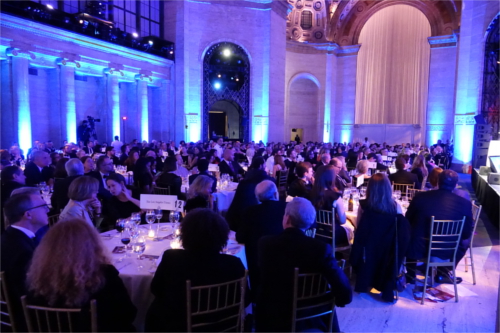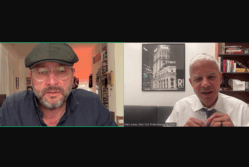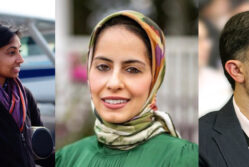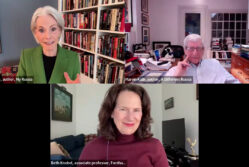Event Coverage Highlight

Annual Awards Dinner Honors Courageous Journalism
by Gabrielle Paluch
Foreign correspondents, members of the Overseas Press Club and corporate sponsors gathered on April 18 at Cipriani 25 Broadway in Manhattan for the annual gala to celebrate award winners and honor journalists who faced great personal peril in the field over the last year.
“While this is journalism we admire, even more important, it is work we need,” said keynote speaker Martin Baron, executive editor of The Washington Post, who highlighted the achievements of journalists who uncovered crimes and disasters around the world this year, even as the press was vilified back home. “If our government proudly exports language that vilifies an independent press, we endanger them – and break faith with what we as a nation have long stood for. If we import that language from authoritarian regimes, we threaten what has kept us free.”
Washington Post columnist and associate editor David Ignatius lit a candle to honor the 53 journalists killed in 2018, including his friend and former colleague Jamal Khashoggi, who was slain at the Saudi Arabian consulate in Istanbul while working on a story.
“Jamal knew when he walked into the Saudi consulate in Istanbul that he was a marked man,” Ignatius said. “The wonderful thing about Jamal was that he kept going. He walked into that consulate, he continued to write his columns, he continued to do his work. And the simple truth about him is that he loved being a journalist.”
OPC President Pancho Bernasconi bestowed the President’s Award on Maggie Steber, whose arresting, intimate photography work documenting face transplant recipients for National Geographic demonstrated her “preternatural ability to get into a story subject’s life in a way that most cannot.”
“I feel very deeply all my pictures belong to the people in them; they don’t belong to me,“ Steber said.
Awards presenter Lester Holt, anchor for NBC Nightly News and Dateline NBC, presented the awards.
Three awards were given for coverage of the war in Yemen, including a New York Times Magazine piece chronicling the journey of a precision missile from creation in Tucson, Arizona, to its deployment in Yemen on a group of villagers planning to dig a well. Additional regions and conflicts represented included the aftermath of the war in Syria, atrocities committed against the Rohingya in Myanmar, Venezuela, and Gaza. The New York Times hauled in six awards, while two-time award winners included VICE News Tonight on HBO, The Washington Post, The Associated Press and Reuters. The Pulitzer Center on Crisis Reporting supported three of the winning awards.
The prestigious Hal Boyle Award for best newspaper or news service reporting from abroad was won by Sudarsan Raghavan for his Yemen coverage in The Washington Post. “In an era where great reporting is often associated with mobilizing massive teams,” the judges said, “sometimes all it takes to deliver outstanding work is one talented reporter with in-depth knowledge of the subject and courage to go digging in the field.”
Reuters journalists Wa Lone and Kyaw Soe Oo were honored with the Bob Considine Award for their investigation into a massacre in the Myanmar village of Inn Din, the work for which they were jailed.
“Their journalistic mission led to an outstanding series of articles exposing and explaining the atrocities against the Rohingya,” the judges wrote. Unable to attend in person, their colleague Simon Lewis expressed gratitude on their behalf. “They are both fathers to young daughters, from whom they have been separated for too long,” he said, “we miss them both dearly.”
The Cornelius Ryan Award for the best non-fiction book on international affairs went to Rania Abouzeid for her searing account of the lives of Syrians from all sides caught up in a catastrophic war, “No Turning Back,” published by W.W. Norton & Company. In her acceptance speech, Abouzeid explained that what motivated her to write the book was the U.N.’s announcement that they had decided to stop counting the dead in Syria’s war. “Nobody is voiceless,” she said, “we just need to listen.”
For their in-depth podcast series, “Caliphate,” journalists at The New York Times received the Lowell Thomas Award. “We had a vision of explaining the radicalization process step by step,” awardee Rukmini Callimachi said, as she explained what processes were behind the creation of the podcast, including a shocking confession from a source, who admitted to having killed someone at the direction of ISIS. Over months of reporting, Callimachi and her colleagues were able to reveal in detail how ISIS recruits and functions, frequently encountering such difficult admissions. “We thank our editors for giving us the time to make this uncomfortable podcast.”
Patrick Chappatte, cartoonist for The New York Times, won the award for best cartoon on international affairs. Among the slides he displayed was a work judges singled out for illustrating the kinds of freedom that democracy needs and autocracy fears: A scene inside a Saudi Arabian classroom “that highlighted the changing face of that country and the dangers inherent in one particular profession -journalism.”
All three awards in photography went to women. Carolyn Van Houten of The Washington Post won the Robert Capa Gold Medal Award for her months of documenting migrant caravans during their journeys through Central America. Nariman El-Mofty won the Olivier Rebbot Award for her photos of Yemenis affected by war. And for her quiet, intimate glimpse into the lives of elderly women living in Japanese prisons, Shiho Fukada won the award for feature photography for work published in Bloomberg Businessweek. Fukada spoke about what her work said about the role of women in Japanese society. “They said going to prison was the first time they felt they had been paid attention to,” she said. “Just because they had a family didn’t mean these women had a home.”




